Vicente Fox
| Vicente Fox | |
|---|---|
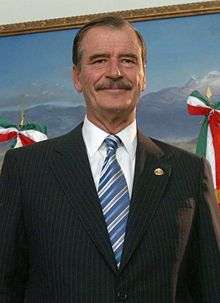 | |
| 55th President of Mexico | |
|
In office 1 December 2000 – 30 November 2006 | |
| Preceded by | Ernesto Zedillo |
| Succeeded by | Felipe Calderón |
| Governor of Guanajuato | |
|
In office 25 September 1995 – 25 September 1999 | |
| Preceded by | Carlos Medina Plascencia |
| Succeeded by | Ramón Martín Huerta |
| Co–President of Centrist Democrat International alongside Pier Ferdinando Casini | |
|
Assumed office 2006 | |
| Personal details | |
| Born |
Vicente Fox Quesada 2 July 1942 Mexico City, Mexico |
| Political party | National Action |
| Spouse(s) |
Lilian de la Concha (m. 1969; div. 1990) Marta Sahagún (m. 2001) |
| Alma mater |
Universidad Iberoamericana Harvard University |
| Occupation | |
| Religion | Roman Catholicism |
| Signature |
 |
Vicente Fox Quesada (American Spanish: [biˈsente ˈfoks keˈsaða]; born 2 July 1942) is a Mexican businessman who was President of Mexico from 1 December 2000, to 30 November 2006 under the National Action Party (PAN). He is also the Co-President of the Centrist Democrat International, an international organization of center-right political parties.[1]
Fox was elected President of Mexico in the 2000 presidential election, a historically significant election that made him the first president elected from an opposition party since Francisco I. Madero in 1910 and the first one in 71 years to defeat, with 42 percent of the vote, the Institutional Revolutionary Party (PRI).[2]
After serving as president of Mexico for six years, President Fox returned to his home state of Guanajuato, where he resides with his wife and family. Since leaving the presidency, Vicente Fox has been involved in public speaking and the development of the Vicente Fox Center of Studies, Library and Museum.[3]
Early years
Vicente Fox was born in Mexico City on 2 July 1942, the second of nine children. His father was José Luis Fox Pont, a native-born Mexican,[4] and his mother was Mercedes Quesada Etxaide, a Basque from San Sebastián, Gipuzkoa, in Spain. José Fox's paternal grandfather was born Joseph Louis Fuchs in Cincinnati, Ohio, the son of German Catholic immigrants, Louis Fuchs and Catherina Elisabetha Flach, of Strasbourg, now in France. The "Fuchs" surname was changed from German during the 1870s to its English equivalent, "Fox".[5] The family was unaware of its German origins and they believed the Fox family had their origins in Ireland until it was discovered otherwise later in Fox's life.
Fox spent his childhood and adolescence at the family ranch in San Francisco del Rincón in Guanajuato. He moved to Mexico City to attend the Universidad Iberoamericana and received a bachelor's degree in business administration in 1964. He earned a diploma in Management Skills from the Harvard Business School in the United States in 1974.[6]
In 1964, Fox went to work for the Coca-Cola Company, where he started as a route supervisor, and he drove a delivery truck. He quickly rose in the company to become the supervisor of Coca-Cola's operations in Mexico, and later all of Latin America. It was during the Fox presidency of Coca-Cola México that the product became Mexico's top-selling soft drink, increasing Coca-Cola's sales by almost 50%[7] using ethically questionable tactics that obstructed access to local groundwater,[8] contributing to Mexico's diabetes epidemic, currently the nation's leading cause of death.[9]
Vicente Fox married a receptionist at Coca-Cola, Lilian de la Concha.[10] They adopted four children, Ana Cristina, Vicente, Paulina and Rodrigo.[11] In 1990, after 20 years of marriage, Lilian filed for and was granted a divorce.
Vicente Fox remarried on 2 July 2001 while in office as President. He married Marta María Sahagún Jiménez (until then his spokesperson). The date was the first anniversary of his presidential election and his 59th birthday. For both, this was their second marriage.
After retiring from Coca-Cola, Vicente Fox began to participate in various public activities in Guanajuato, where he created the "Patronato de la Casa Cuna Amigo Daniel", an orphanage. He was the president of the Patronato Loyola, a sponsor of the León campus of the Universidad Iberoamericana and of the Lux Institute.[12]
Early political career
With the support of Manuel Clouthier, Vicente Fox joined the Partido Acción Nacional on 1 March 1988. That same year, he ran for and was elected to the federal Chamber of Deputies representing the Third Federal District in León, Guanajuato.[12]
Governor of Guanajuato
After serving in the Chamber of Deputies, Fox sought the governorship in Guanajuato in 1991, but lost to Ramón Aguirre Velázquez of the PRI. Following the election, local discontent was so great that the state Congress appointed Carlos Medina Plascencia of the PAN as interim governor.[13] Four years later, Fox ran again, winning by a vote of 2 to 1.[12]
As governor, Fox promoted government efficiency and transparency. He was one of the first state governors of Mexico to give a clear, public and timely account of the finances of his state.[14]
Fox pushed for the consolidation of small firms, promoted the overseas sales of goods manufactured in Guanajuato and created a unique system in which micro-credits with no overdue portfolio were granted. Under Fox, the state became the fifth most important Mexican state economy.[14]
Campaign for President
On 7 July 1997 (three years before the presidential election of 2000), Vicente Fox decided to run for President of Mexico. In spite of opposition within his party, Fox secured his candidacy representing the Alliance for Change, a political coalition formed by the National Action Party and the Green Ecological Party of Mexico on 14 November 1999.
During the course of his campaign a presidential debate was organized. There was a disagreement between the three main contenders, Fox, Francisco Labastida of the PRI and Cuauhtémoc Cárdenas of the PRD, and some of the arguments were broadcast on national television, notably the one on whether the debate should be held that same day or the following Friday.[15] For minutes, Fox kept repeating the word "Hoy" meaning "today", originating the famous phrase "¡Hoy, hoy, hoy!" The other candidates decided to postpone the debate, but Fox used that day's airtime anyway. At first, the action brought upon Fox criticism, but the slogan "today" gained support as it encapsulated Fox's idea of an improved future.
During the presidential debate his main opponent, Francisco Labastida, claimed in a nationally televised debate that Vicente Fox had repeatedly called him a "sissy" and a "cross-dresser".[16] Fox's campaign slogans were "¡Ya!" ("Right now!"), "Ya ganamos" ("We've already won") and "Vota Alianza por el Cambio" ("Vote for Alliance for Change").
Amigos de Fox
Amigos de Fox ("Friends of Fox") was a non-profit fundraising group established by Denise Montaño that was instrumental in getting Vicente Fox elected President of Mexico. The phrase was also used as a campaign slogan referring to the millions of people supporting Fox in the 2000 presidential elections.[17]
In 2003, money-laundering charges were lodged against the fund-raising group, but were dropped shortly before the July 2003 mid-term elections.[18]
Election results
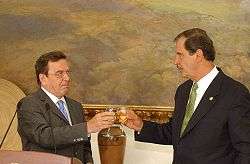
On 2 July 2000 (Fox's 58th birthday), he won the presidential election with 43% (15,989,636 votes) of the popular vote, followed by the Institutional Revolutionary Party (PRI) candidate Francisco Labastida with 36% (13,579,718 votes), and Cuauhtémoc Cárdenas of the Party of the Democratic Revolution (PRD) with 17% (6,256,780 votes). Vicente Fox declared victory that same night, a victory which was ratified by President Zedillo. After the final results were announced, President-elect Vicente Fox met with thousands of supporters at the Angel of Independence monument in Mexico City, to address his supporters and celebrate his victory. His opponents conceded the election later that night.
President-elect Vicente Fox received an enormous amount of media coverage, as well as many congratulating messages and phone calls from world leaders including then President of the United States, Bill Clinton.
Fox took office as president on 1 December 2000, marking the first time in Mexico's history (the country had gained independence in 1821) that an incumbent government peacefully surrendered power to an elected representative of the opposition.
Presidency
- See article Fox administration
Public image
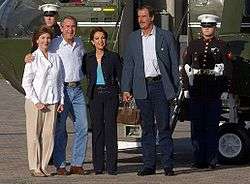
During his campaign for president, Vicente Fox became well known for his unique cowboy style and popular charisma. As speaker, Fox usually gathered big crowds in early years of his presidency.[19]
At 193 cm (6 ft 4 in), President Fox easily stood out in most crowds, and is believed to be one of the tallest presidents in Mexico's history.[20] After his inauguration, President Fox usually only wore suits for formal occasions, opting to wear his signature boots and jeans throughout his many visits around Mexico.[21]
Fox spread his image as one of peace and thus welcomed many to his own ranch in Guanajuato, Mexico. When President Fox welcomed U.S. President George W. Bush to his ranch in Guanajuato, both presidents were wearing Fox's signature black cowboy boots, prompting The Wall Street Journal to call it "The Boot Summit".[22]
Historian Philip Russell summarizes the strengths and weaknesses of Fox as president of Mexico:
- "Marketed on television, Fox made a far better candidate than he did president. He failed to take charge and provide cabinet leadership, failed to set priorities, and turned a blind eye to alliance building....By 2006, as political scientist Soledad Loaeza noted, "the eager candidate became a reluctant president who avoided tough choices and appeared hesitant and unable to hide the weariness caused by the responsibilities and constraints of the office." ....He had little success in fighting crime. Even though he maintained the macroeconomic stability inherited from his predecessor, economic growth barely exceeded the rate of population increase. Similarly, the lack of fiscal reform left tax collection at a rate similar to that of Haiti....Finally, during Fox's administration, only 1.4 million formal-sector jobs were created, leading to massive immigration to the United States and an explosive increase in informal employment."[23]
Controversial comments
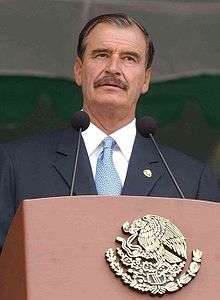
- In March 2002, two days prior to the International Conference on Financing for Development held in Monterrey, Nuevo León. Fox called Cuban President Fidel Castro and instructed him to limit his comments about the United States, and that he should leave Mexico after he delivers his speech and eats a meal. Castro later called this a "despicable betrayal".[24]

- In May 2005, a controversy arose over comments Fox made during a meeting with Texas businesspeople in which he said, "There is no doubt that Mexicans, filled with dignity, willingness and ability to work, are doing jobs that not even blacks want to do there in the United States". This angered many African-Americans in the United States, prompting many black leaders to demand an apology from Fox. The Reverend Al Sharpton requested a formal apology from Fox to the African-American community and called for an economic boycott of Mexican products until an apology was received; he and many African-Americans felt that Fox's comments were insensitive and racist. The Reverend Jesse Jackson, during a news conference concerning Fox's statement about African-Americans, said that he felt that the comments were, "unwitting, unnecessary and inappropriate" and added that "[Fox's] statement had the impact of being inciting and divisive".[25]
- Fox was also known to have mispronounced the name of Argentine writer Jorge Luis Borges as "José Luis Borgues" in the Royal Congress of the Spanish Language. This error sparked accusations of an "uncultured" President.[26]
- On 30 May 2005, President Fox told reporters that the majority of the female homicides in Ciudad Juárez had been resolved and the perpetrators placed behind bars. He went on to criticize the media for "rehashing" the same 300 or 400 murders, and said matters needed to be seen in their "proper dimension".
- In 2006, after Bolivian President Evo Morales refused to sell natural gas, Fox said, "Well, they'll either have to consume it all themselves or they're going to have to eat it."[27]
- In yet another controversial move he decided to cancel the parade commemorating the 96th anniversary of the Mexican Revolution to take place 20 November, arguing that it is an obsolete celebration in which nobody wants to participate any more. Some analysts considered that this was a response to Andrés Manuel López Obrador's assumption of an alternative presidency to take place the same day. Some considered it a smart decision, while others viewed it as a sign of political weakness.[28]
- On 8 March 2006, in the wake of the murder of Canadian couple Domenico and Nancy Ianiero at a resort in Cancún, Fox said that there was evidence that pointed to Canadian suspects from Thunder Bay, in order to assert that Cancún remained a safe vacation resort. Fox's comments were criticized by the Ianieros' lawyer Edward Greenspan for compromising the investigation, which Mexican authorities were considered to have largely mishandled. Quintana Roo attorney general Bello Melchor Rodríguez later stated that the Canadians were never considered as suspects.[29][30]
- In November 2006, the TV network Telemundo released a video that had been recorded previous to an interview with President Fox in which he stated: "Ya hoy hablo libre, ya digo cualquier tontería, ya no importa, ya total, yo ya me voy" which means "Now, I speak freely. Now, I say whatever nonsense. It doesn't matter anymore. Anyway, I'm already leaving." Then, during the interview he talked about the violent situation in Oaxaca. The President's office complained about the release of this images and said he was not aware of the camera and microphones being turned on. News agency EFE accused Telemundo of acting unethically, because the video was EFE's intellectual property.[31]
- In a lecture in the United States, in which he was a keynote speaker, he identified Peruvian writer Mario Vargas Llosa as a Colombian Nobel laureate (Spanish by naturalization) and, at the time, was not a Nobel Laureate.[26] Later, in October 2010, Fox congratulated Vargas Llosa on Twitter for winning the Nobel Prize in Literature, but he incorrectly attributed a Nobel Prize to Jorge Luis Borges.[32]
Post-presidential life
Public speaking and advocacy
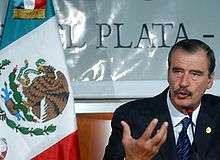
After leaving office in December 2006, Fox has maintained himself in the public eye by speaking in countries such as Nigeria, Ireland,[33] Canada, and the United States about topics such as the controversial 2006 election and the Iraq War. In Mexico, Fox's busy post-presidency has caused much criticism because former Mexican presidents have been expected to stay out of the political spotlight. Nevertheless, Fox stated, "There is no reason to hold to the anti-democratic rules of those who still live in the authoritarian past…now that Mexico is a democracy, every citizen has the right to express himself, even a former president."[34]
Vicente Fox joined 4 other Latin American presidents at the One Young World Summit 2014 in Dublin, Ireland,[35] to discuss the Telefónica Millennial Survey. He told those in the audience that eradicating corruption "has to start with education" and that his focus is now on promoting leadership.[36]
Vicente Fox is a member of the Global Leadership Foundation, a not-for-profit organization that offers, discreetly and confidentially, a range of experienced advisors to political leaders facing difficult situations.
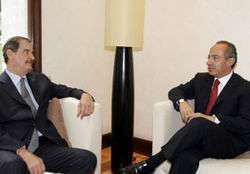
In 2013, Fox discussed why the West has pursued a moral crusade against drugs at HowTheLightGetsIn festival in Hay-on-Wye.[37] with Chris Bryant and John Ralston Saul. The three debated whether it is hypocritical to ban certain drugs while continuing to export others such as alcohol and tobacco. Should we follow the lead of Washington and Colorado states in the U.S. and allow the free trading of drugs?
Vicente Fox gave a video interview in July 2013 to High Times, in which he discussed the failure of drug prohibition, and cited Portugal's decriminalization policies as "working splendid(ly)". He said he supports drug legalization despite not being a user himself, just as he said he also "fully respects" same-sex marriage although he does not personally agree with it.[38]
In February 2014, Fox wrote an opinion piece that was published in Toronto's Globe and Mail in which he stated: "Legalization of not just marijuana, but all drugs, is the right thing to do."[39]
He also said that "we must be given the very freedom to decide our own behaviour and to act responsibly, as long as we do not detrimentally affect the rights of others".[39]
In 2016, Fox co-signed a letter to Ban Ki-moon calling for a more humane drug policy.
Criticism of Donald Trump
During the 2016 U.S. presidential election campaign, Fox has emerged as an outspoken critic of Republican candidate and later nominee Donald Trump. In an interview with Univision's Jorge Ramos in February 2016, Fox responded to Trump's proposal to build a wall at the border between the United States and Mexico at Mexico's expense,[40] declaring in English that Mexico is "not going to pay for that fucking wall. He should pay for it. He's got the money." Fox went on to call Trump a "crazy guy" and a "false prophet", and questioned the claim that Trump received 44% of the Hispanic vote in the Republican caucus in Nevada.[41] Trump took to Twitter in response, demanding that Fox apologize for using "the F word while discussing the wall".[42] Fox eventually apologized for the remark,[43] while also asking for Trump to apologize for his remarks about Mexicans and inviting Trump to visit Mexico.[43]
Despite his apology, Fox continued to criticize Trump to the international media and troll Trump on Twitter, stating, "I'm committed to be Donald Trump's shadow until he is done with politics."[44] When Trump visited Mexico on 31 August 2016 upon President Enrique Peña Nieto's invitation, Fox slammed the visit, calling it a "desperate move" on the part of Peña Nieto and stating, "He is not welcome in Mexico. We don't like him. We don't want him. We reject his visit."[45] Trump responded by pointing out Fox's previous invitation, to which Fox clarified that he invited Trump to Mexico on the condition that he used the visit to apologize to the Mexican people.[45] He directly addressed the American people the next day on CNN, where he described Trump as a "false prophet" who is "absolutely crazy" and warned that they need to "wake up" and realize the harm that Trump's immigration and economic policies would inflict on the United States.[46]
Later in September 2016, The Washington Post reported that Fox had received multiple emails from Trump's campaign soliciting donations throughout the month.[47] Fox received the first email on 9 September, which he posted on Twitter and responded, "Donald Trump, I won't pay for that fucking wall! Also, campaigning in Mexico? Running out of money and friends?"[48] Fox received two additional emails on 24 and 27 September, both of which he also posted on Twitter and mocked as being "desperate" and "begging".[49][50] The revelation of the emails has raised concern, as accepting campaign donations from foreign nationals is illegal in the United States.[47]
Autobiography
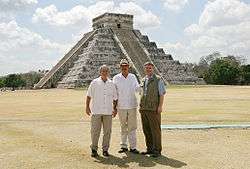
Fox's autobiography, entitled Revolution of Hope: The Life, Faith and Dreams of a Mexican President, was released in September 2007.[51] To promote its release, Fox toured many U.S. cities to do book-signings and interviews with U.S. media. During his tour, however, he faced protests from Mexican immigrants who accused him of actions that forced them to emigrate and find jobs in the United States.[52] He faced the subject several times during interviews, such as one held with Fox News's Bill O'Reilly, who questioned him about the massive illegal immigration problem of Mexicans into the United States.[53] Finally, during an interview with Telemundo's Rubén Luengas, the interviewer asked Fox about allegations concerning some properties of Vicente Fox's wife, Marta Sahagún. After Fox explained the situation, he asked the interviewer not to make false accusations and to prove what he was saying. Luengas said, "I'm telling you in your face, I'm not a liar." After this, Fox walked out of the studio, calling the interviewer a "liar", "vulgar", and "stupid".[54] Upon the book's release, many were surprised to read several excerpts in which Fox was highly critical of U.S. President George W. Bush, considered by many to be a close friend. For example, Fox wrote that Bush was "the cockiest guy I have ever met in my life", and claimed that he was surprised that Bush had ever made it to the White House. Later, in an interview with Larry King, Fox explained that this was a misunderstanding; what he meant by calling George W. Bush "cocky" was to say he was "confident".[55] Fox also referred to Bush in his autobiography as a "windshield cowboy", due to Bush's apparent fear of a horse Fox offered him to ride.[56]
Fox Center of Studies, Library and Museum
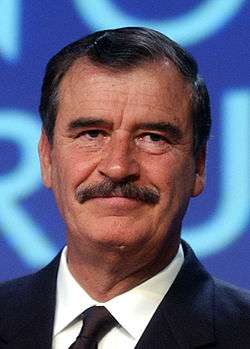
On 12 January 2007,[57] over a month after he left office, Vicente Fox announced the construction of a center of studies, library and museum that has been labeled by the U.S. press as Mexico's first presidential library.[58][59][60] The project will be a library, museum, a center for the advancement of democracy, a study center and a hotel, and it will be completely privately funded.[61][62] It is expected to be a genuine U.S.-style presidential library. It will be built in Fox's home state of Guanajuato, in his home town of San Francisco del Rincón.
While museums are abundant throughout the country, there is nothing comparable to a presidential library where personal documents, records, and gifts amassed by the country's leader are opened to the public. Fox's library will be modeled after the Bill Clinton Library in Little Rock, Arkansas,[63] which, according to the former president, will allow Mexicans to enjoy, for the first time in Mexico's history, the liberty to review the documents, images and records that made up his six years as president.[64]
According to the official website, the construction of the Center is in progress and advancing.[65] Final completion of the library was expected by late 2007.
There was news in the media on Centro Fox joining hands with UST Global to transform Mexico.[66] Fox stated in a press release that "UST Global is partnering Centro Fox in order to help accomplish nothing less than the transformation of my country into a world-class technology economy...Together, we will establish Mexico at the forefront of the information technology revolution in the region."
Centrist Democratic International
On 20 September 2007, Fox was elected Co-President of the Centrist Democratic International (along with the re-elected Pier Ferdinando Casini) at its leaders' meeting in Rome. The CDI is the international organization of political parties that counts Fox's party, the National Action Party, as a member.[67]
Statue controversy
In October 2007, an announcement was made in the municipality of Boca del Río, Veracruz, that a 3-meter (10 ft) statue of Vicente Fox was to be erected to honor the former president. This aroused much criticism from the opposition Party of the Democratic Revolution and Mexican media "towards Boca del Río's mayor", "who is affiliated with the National Action Party, of which Fox is also a member".
The statue was put in place amidst protests on the dawn of 13 October 2007. The inauguration was to have been held on 14 October. Some hours after the installation, a crowd of about 100 people brought the statue down with a rope, damaging it. The statue was put back in place for the inauguration, then taken away for repairs.[68]
PAN members accused Veracruz's governor, Fidel Herrera Beltrán, of "ordering the attack on the statue", while Fox called him intolerant. Some sources in the media considered that the installation of the statue was inappropriate, since former President Fox was facing allegations relating to an illicit enrichment scandal.
Many of the protesters were members of the center-left Institutional Revolutionary Party (PRI), which governed Mexico for much of the 20th century, until Fox (of the National Action Party, PAN) won the 2000 presidential election, ousting the PRI from power.[69]
Honours
-
 Collar of the Order of the Liberator General San Martín (Argentina)
Collar of the Order of the Liberator General San Martín (Argentina) -
 Grand Star of the Decoration of Honour for Services to the Republic of Austria (Austria, 2005)[70]
Grand Star of the Decoration of Honour for Services to the Republic of Austria (Austria, 2005)[70] -
 Grand Cross of the Order of Vytautas the Great (Lithuania, 14 January 2002)[71]
Grand Cross of the Order of Vytautas the Great (Lithuania, 14 January 2002)[71] -
 Honorary Knight Grand Cross of the Order of St Michael and St George (United Kingdom)
Honorary Knight Grand Cross of the Order of St Michael and St George (United Kingdom) -
 Collar of the Order of Isabella the Catholic (Spain, 8 November 2002)[72]
Collar of the Order of Isabella the Catholic (Spain, 8 November 2002)[72] -
 Knight of the Royal Order of the Seraphim (Sweden, 22 October 2002)[73]
Knight of the Royal Order of the Seraphim (Sweden, 22 October 2002)[73]
Ancestry
| Ancestors of Vicente Fox[74] | ||||||||||||||||||||||||||||||||||||||||||||||||||||||||||||||||||||||||||||||||||||||||||||||||||||||||||||||||||||||||||||||||||||||||||||||||||||||||||||||||||||||||||||||||||||||||||||||||||||||||||||||||||||||||||||||||||||||||||||||||||||||||||||||||||||||||||||||||||||||||||||||||||||||||||||||||||||||||||||||||||||||||||||||||||||||||||||||||||||||||||||||||||||||||||||||||||||||||||||||||||||||||||||||||||||||||||||||||||||||||||||||||||||||||||||||||||||||||||||||||||||||||||||||||||||||||||||||||||
|---|---|---|---|---|---|---|---|---|---|---|---|---|---|---|---|---|---|---|---|---|---|---|---|---|---|---|---|---|---|---|---|---|---|---|---|---|---|---|---|---|---|---|---|---|---|---|---|---|---|---|---|---|---|---|---|---|---|---|---|---|---|---|---|---|---|---|---|---|---|---|---|---|---|---|---|---|---|---|---|---|---|---|---|---|---|---|---|---|---|---|---|---|---|---|---|---|---|---|---|---|---|---|---|---|---|---|---|---|---|---|---|---|---|---|---|---|---|---|---|---|---|---|---|---|---|---|---|---|---|---|---|---|---|---|---|---|---|---|---|---|---|---|---|---|---|---|---|---|---|---|---|---|---|---|---|---|---|---|---|---|---|---|---|---|---|---|---|---|---|---|---|---|---|---|---|---|---|---|---|---|---|---|---|---|---|---|---|---|---|---|---|---|---|---|---|---|---|---|---|---|---|---|---|---|---|---|---|---|---|---|---|---|---|---|---|---|---|---|---|---|---|---|---|---|---|---|---|---|---|---|---|---|---|---|---|---|---|---|---|---|---|---|---|---|---|---|---|---|---|---|---|---|---|---|---|---|---|---|---|---|---|---|---|---|---|---|---|---|---|---|---|---|---|---|---|---|---|---|---|---|---|---|---|---|---|---|---|---|---|---|---|---|---|---|---|---|---|---|---|---|---|---|---|---|---|---|---|---|---|---|---|---|---|---|---|---|---|---|---|---|---|---|---|---|---|---|---|---|---|---|---|---|---|---|---|---|---|---|---|---|---|---|---|---|---|---|---|---|---|---|---|---|---|---|---|---|---|---|---|---|---|---|---|---|---|---|---|---|---|---|---|---|---|---|---|---|---|---|---|---|---|---|---|---|---|---|---|---|---|---|---|---|---|---|---|---|---|---|---|---|---|---|---|---|---|---|---|---|---|---|---|---|---|---|---|---|---|---|---|---|---|---|---|---|---|---|---|---|---|---|---|---|---|---|---|---|---|---|---|---|---|---|---|---|---|---|---|---|---|---|---|---|---|---|---|---|---|---|---|---|---|---|---|---|---|---|---|---|---|---|---|---|---|---|---|---|---|---|---|---|---|---|---|---|---|---|---|---|---|---|---|---|---|---|---|---|---|---|---|---|---|---|---|---|---|---|---|---|---|---|---|---|---|---|
| ||||||||||||||||||||||||||||||||||||||||||||||||||||||||||||||||||||||||||||||||||||||||||||||||||||||||||||||||||||||||||||||||||||||||||||||||||||||||||||||||||||||||||||||||||||||||||||||||||||||||||||||||||||||||||||||||||||||||||||||||||||||||||||||||||||||||||||||||||||||||||||||||||||||||||||||||||||||||||||||||||||||||||||||||||||||||||||||||||||||||||||||||||||||||||||||||||||||||||||||||||||||||||||||||||||||||||||||||||||||||||||||||||||||||||||||||||||||||||||||||||||||||||||||||||||||||||||||||||
See also
- List of presidents of Mexico
- National Action Party (Mexico)
- Mexican general election, 2000
- History of Mexico
- Politics of Mexico
Notes
- Specific
- ↑ Who's Who at CDI-IDC
- ↑ Milner, Kate (2 July 2000). "End of era for all-powerful party". BBC News. Retrieved 28 November 2008.
- ↑ es: CentroFox.org.mx
- ↑ Martínez, Fabiola (1 September 2006). "Indagará PGR origen de un acta de nacimiento del padre de Fox". El periódico de México. Archived from the original on 4 June 2008. Retrieved 4 June 2007.
- ↑ Ancestry.com. Cincinnati, Ohio Directory, 1890-91 [database on-line]. Provo, UT, USA: MyFamily.com, Inc., 2000. Original data: Cincinnati, OH, USA: Williams & Co., 1890.
- ↑ "Vicente Fox". Retrieved 27 June 2010.
- ↑ Milner, Kate (3 July 2000). "Profile: Vicente Fox". BBC. Retrieved 4 June 2007.
- ↑ Nash, June (November 2007). "CONSUMING INTERESTS: Water, Rum, and Coca-Cola from Ritual Propitiation to Corporate Expropriation in Highland Chiapas". Cultural Anthropology. 22 (4): 621–639. doi:10.1525/can.2007.22.4.621. Retrieved 25 July 2016.
- ↑ Rosenberg, Tina (3 November 2015). "How one of the most obese countries on earth took on the soda giants". The Guardian. Retrieved 25 July 2016.
- ↑ "5 cosas que debes saber sobre Lilián de la Concha, ex esposa de Fox y vinculada al Cártel del Milenio". 23 October 2013. Retrieved 6 November 2016.
- ↑ BeleJack, Barbara (16 February 2001). "Live, from Guanjuato: It's President VICENTE FOX!". Texas Observer. Retrieved 4 June 2007.
- 1 2 3 Biography of Vicente Fox Archived 18 September 2012 at the Wayback Machine.
- ↑ "Vicente Fox: President Elect of Mexico". 2000. Archived from the original on 7 March 2007. Retrieved 4 June 2007.
- 1 2 Biography of Vicente Fox, United Nations (accessed 20 January 2010).
- ↑ Encyclopedia.com. Archived 2 October 2009 at the Wayback Machine.
- ↑ "BBC News - AMERICAS - Profile: Vicente Fox". Retrieved 6 November 2016.
- ↑ LaRaza.com. Archived 12 October 2007 at the Wayback Machine.
- ↑ Foundation, Thomson Reuters. "Humanitarian - Thomson Reuters Foundation News". Retrieved 6 November 2016.
- ↑ Capoza, Koren L. "Taking back the barrio". Retrieved 6 November 2016.
- ↑ "Profile: Vicente Fox". BBC News. 3 July 2000. Retrieved 27 May 2010.
- ↑ "Google Images". Retrieved 6 November 2016.
- ↑ "Google Images". Retrieved 6 November 2016.
- ↑ Russell, Philip (2011). The History of Mexico: From Pre-Conquest to Present. Routledge. p. 593.
- ↑ Weiner, Tim. "Castro's Attack on Fox Places Cuban-Mexican Ties in Danger". NY Times.
- ↑ "Mexican leader criticized for comment on blacks", CNN.com, 15 May 2005.
- 1 2 "Vuelve Fox a incurrir en error cultural en discurso", El Universal, México.
- ↑ "Evo pide a Fox que no trate de humillarlo por presunta negativa a vender gas a México" 24 March 2008.
- ↑ "Cancela Fox, porque son 'tiempos democráticos', el desfile deportivo del 20 de noviembre; PRI considera que cedió la plaza a López". 24 March 2008.
- ↑ Suspects in Ianiero murder likely Canadian: Fox. 29 March 2006.
- ↑ A timeline of the case. 26 July 2006. Archived 14 March 2013 at the Wayback Machine.
- ↑ El Porvenir | Nacional | 'Puedo decir cualquier tontería... ya me voy': Fox
- ↑ Fox incurre en error al felicitar a Vargas Llosa. 7 October 2010.
- ↑ "One Young World Archives - Telefonica". Retrieved 6 November 2016.
- ↑ Wall, Allan. "Fox Redefines the Role of Past Mexican Presidents" (accessed 20 January 2010).
- ↑ "Centro Fox » (Español) Vicente Fox participa en cumbre mundial One Young World 2014: "La erradicación de la corrupción tiene que empezar con la educación"". Retrieved 6 November 2016.
- ↑ One Young World (17 October 2014). "President Vicente Fox of Mexico Introduces Himself". Retrieved 6 November 2016 – via YouTube.
- ↑ Fox, Vicente. "Drugs, Money and Morality". IAI. Retrieved 29 January 2014.
- ↑ Hampton, Justin. "President Vicente Fox: The HIGH TIMES Interview". High Times. Retrieved 18 February 2014.
- 1 2 Fox, Vicente (17 February 2014). "For Mexico, legalization is freedom". Toronto: Globe and Mail. Retrieved 18 February 2014.
- ↑ "Immigration". Retrieved 6 November 2016.
- ↑ "Former Mexican President to Donald Trump: 'I'm not going to pay for that fucking wall'". Retrieved 6 November 2016.
- ↑ "Donald J. Trump on Twitter". Retrieved 6 November 2016.
- 1 2 "Vicente Fox apologizes to Trump for wall outburst". Retrieved 6 November 2016.
- ↑ "Vicente Fox Quesada on Twitter". Retrieved 6 November 2016.
- 1 2 CNN, David Wright. "Former Mexican President apologizes for Trump invitation". Retrieved 6 November 2016.
- ↑ "Vicente Fox on Trump: 'Please wake up, America'". Retrieved 6 November 2016.
- 1 2 "Donald Trump keeps asking foreign leaders for money. The latest: Vicente Fox.". Retrieved 6 November 2016.
- ↑ "Vicente Fox Quesada on Twitter". Retrieved 6 November 2016.
- ↑ "Vicente Fox Quesada on Twitter". Retrieved 6 November 2016.
- ↑ "Vicente Fox Quesada on Twitter". Retrieved 6 November 2016.
- ↑ Clock ticking for Allyn on Fox book | Dallas Morning News | News for Dallas, Texas | Arts & Entertainment. Archived 30 September 2007 at the Wayback Machine.
- ↑ Fox reaparece en Los Ángeles; entre protestas, defiende logros - El Universal - México
- ↑ "Former Mexican President Vicente Fox Debates Immigration Issue with Bill". Fox News. 10 October 2007.
- ↑ Entrevista con Vicente Fox causa polémica - Noticias - KVEA Los Angeles. Archived 16 July 2011 at the Wayback Machine.
- ↑ Polémica por gira de Fox. Archived 22 October 2007 at the Wayback Machine.
- ↑ "Vicente Fox: Bush a "windshield cowboy" who's scared of horses - Corrente". Retrieved 6 November 2016.
- ↑ "Login Grupo Reforma". Retrieved 6 November 2016.
- ↑ SignOnSanDiego.com > News > Mexico - Fox gets award for reform in Mexico
- ↑ Centrofox.org.mx. Archived 28 September 2007 at the Wayback Machine.
- ↑ MySA.com: Metro | State. Archived 29 September 2007 at the Wayback Machine.
- ↑ "Login Grupo Reforma". Retrieved 6 November 2016.
- ↑ "Login Grupo Reforma". Retrieved 6 November 2016.
- ↑ Fox looks to cement his place in history | The San Diego Union-Tribune
- ↑ . Archived 12 October 2007 at the Wayback Machine.
- ↑ Fox Center. Archived 28 September 2007 at the Wayback Machine.
- ↑ "UST Global in pact with Centro Fox of Mexico". The Hindu. Chennai, India. 18 July 2012.
- ↑ Portail d'informations Ce site est en vente!. Archived 25 July 2011 at the Wayback Machine.
- ↑ La Prensa Latina » Blog Archive » Derriban estatua de Vicente Fox. Archived 4 June 2008 at the Wayback Machine.
- ↑ "Protestors Tear Down Vicente Fox Statue". CBS News. 14 October 2007.
- ↑ "Reply to a parliamentary question about the Decoration of Honour" (PDF) (in German). p. 1711. Retrieved November 2012. Check date values in:
|access-date=(help) - ↑ Lithuanian Presidency website, search form
- ↑ Boletín Oficial del Estado
- ↑ "2002/27" (PDF). Retrieved 6 November 2016.
- ↑ Manila (15 July 2015). "Vicente Fox". Ethnicelebs. Retrieved 6 April 2016.
- General
- Schmidt, Samuel (2000). México encadenado: El legado de Zedillo y los retos de Fox. México, D.F.: Colibrí.
External links
| Wikiquote has quotations related to: Vicente Fox |
| Wikimedia Commons has media related to Vicente Fox. |
- Vicente Fox website during his Presidency
- Vicente Fox Museum and Library
- Extended bio and presidential tenure, by CIDOB Foundation
- Vicente Fox Interview on The Hour with George Stroumboulopoulos
- Vicente Fox at the Internet Movie Database
| Party political offices | ||
|---|---|---|
| Preceded by Diego Fernández de Cevallos |
PAN presidential candidate 2000 |
Succeeded by Felipe Calderón |
| Political offices | ||
| Preceded by Ernesto Zedillo |
President of Mexico 2000–2006 |
Succeeded by Felipe Calderón |
| Preceded by unknown |
Co-President of Centrist Democrat International 2006–present |
Incumbent |
| Diplomatic posts | ||
| Preceded by Jiang Zemin |
Chairperson of APEC 2002 |
Succeeded by Thaksin Shinawatra |
